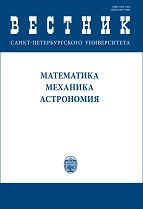|
This article is cited in 2 scientific papers (total in 2 papers)
MATHEMATICS
On the asymptotical separation of linear signals from harmonics by singular spectrum analysis
N. V. Zenkovaa, V. V. Nekrutkinb
a JetBrains Research, 2, ul. Kantemirovskaya, StPetersburg, 197342, Russian Federation
b St Petersburg State University, 7-9, Universitetskaya nab., St Petersburg, 199034, Russian Federation
Abstract:
The general theoretical approach to the asymptotic extraction of the signal series from the additively perturbed signal with the help of singular spectrum analysis (briefly, SSA) was already outlined in Nekrutkin (2010), SII, vol. 3, 297-319. In this paper we consider the example of such an analysis applied to the linear signal and the additive sinusoidal noise. It is proved that in this case the so-called reconstruction errors $r_i(N)$ of SSA uniformly tend to zero as the series length N tends to infinity. More precisely, we demonstrate that $max_{i}|r_i(N)| = O(N^{-1})$ if $N \to \infty$ and the "window length" $L$ equals $(N + 1)/2$. It is important to mention, that the completely different result is valid for the increasing exponential signal and the same noise. As it is proved in Ivanova, Nekrutkin (2019), SII, vol. 12, 1, 49-59, in this case any finite number of last terms of the error series does not tend to any finite or infinite values.
Keywords:
signal processing, singular spectral analysis, separability, linear signal, asymptotical analysis.
Received: 08.09.2021
Revised: 24.10.2021
Accepted: 02.12.2021
Citation:
N. V. Zenkova, V. V. Nekrutkin, “On the asymptotical separation of linear signals from harmonics by singular spectrum analysis”, Vestnik of Saint Petersburg University. Mathematics. Mechanics. Astronomy, 9:2 (2022), 245–254; Vestn. St. Petersbg. Univ., Math., 9:2 (2022), 245–254
Linking options:
https://www.mathnet.ru/eng/vspua6 https://www.mathnet.ru/eng/vspua/v9/i2/p245
|

| Statistics & downloads: |
| Abstract page: | 42 | | Full-text PDF : | 16 | | References: | 26 |
|




 Contact us:
Contact us: Terms of Use
Terms of Use
 Registration to the website
Registration to the website Logotypes
Logotypes








 Citation in format
Citation in format 
